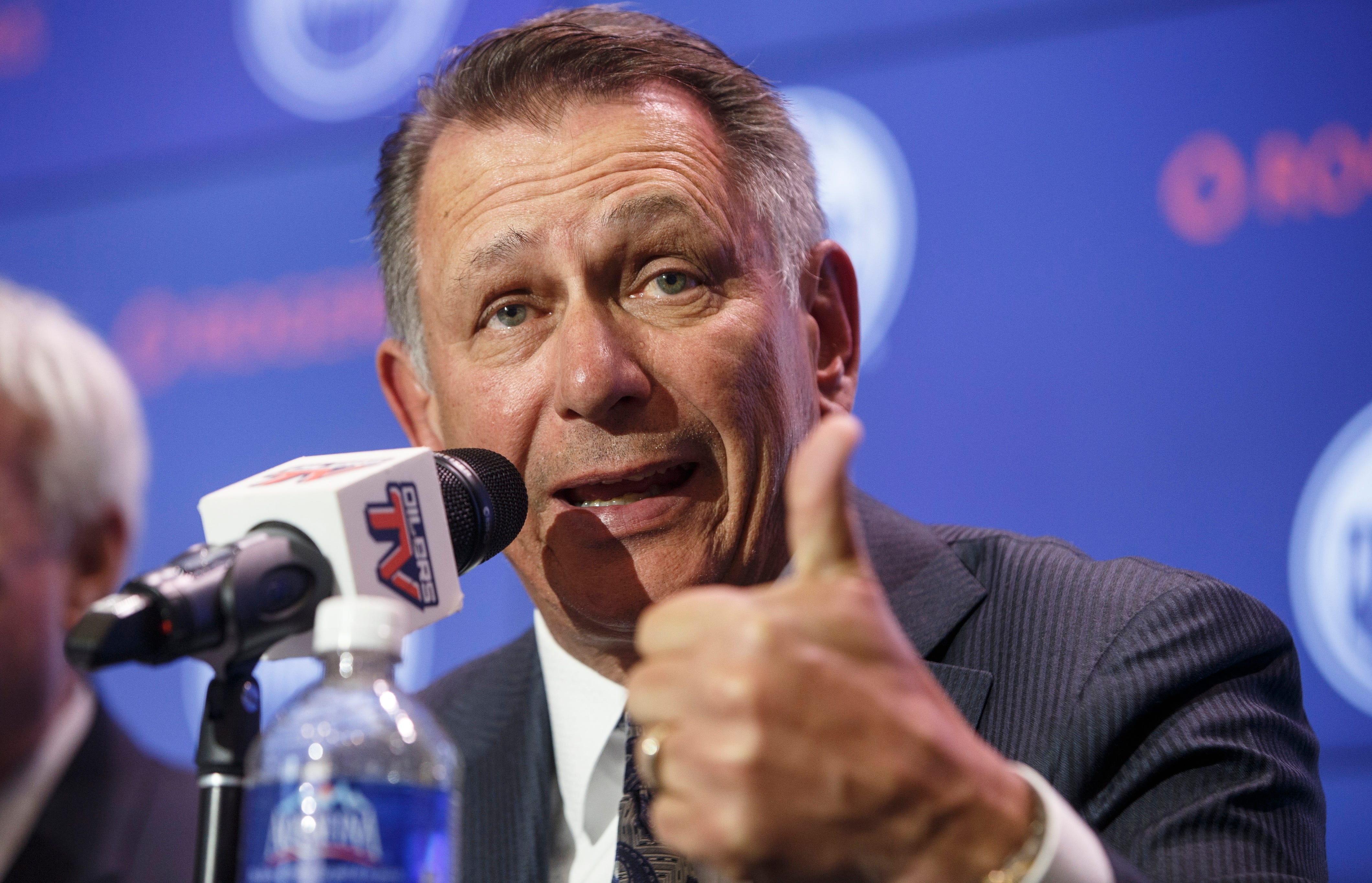Wojo: Ken Holland leaves Red Wings, eager to prove a point
 Bob Wojnowski
Bob Wojnowski
He could’ve chosen the easy path and stayed, accepted the money without the pressure, taken the executive title without the power. And for a week or so, Ken Holland thought about the ring to it — Red Wing for Life, a ceremonial bow on a great career.
That’s what he could’ve done, but at his competitive core, that’s not who he is. Holland has more to do. And in his mind, he has more to prove. I say, good for him, for refusing to be defined by timelines, for wanting to show what he has left, and in some ways, validate what he’s done.
This is the outcome I always suspected, that Steve Yzerman’s arrival would signal Holland’s departure. It’s not acrimonious, but it was probably best not to test the longtime friendship between the two. And besides, an enticing (and lucrative) challenge awaits Holland, 63, in Edmonton. He signed a five-year, $25-million contract to be the GM with full autonomy, where he can rebuild a team without being branded as the guy who tore it down.
It’s a daunting task, fraught with risk, and some fans and media in Edmonton have expressed concern about his recent record. The Oilers are a mess, with a transcendent star in Connor McDavid and no direction. They’ve turned numerous No. 1 overall picks into precisely one playoff appearance in 13 years. The Wings made the postseason 25 straight years, then missed the past three as they launched a necessary rebuild.
Holland took the brunt of the criticism here, and it stung him. Some of it was overblown revisionism. He was surrounded by so many stars on the ice and in the coach’s office, from Scotty Bowman to Mike Babcock, he was never going to get ample credit.
Some of the criticism was justified. Holland handed out too many bad contracts to marginal veterans, from Justin Abdelkader to Frans Nielsen to Darren Helm to Jonathan Ericsson. You can’t fully judge the moves without acknowledging the motives, and the motive from the Ilitches was to keep making the playoffs, especially as the team moved into Little Caesars Arena. That doesn’t excuse Holland’s mistakes, but it underscores the strategy.
“I’ve been a manager for 22 years, and you’re gonna make some bad decisions,” he said Tuesday at a news conference in Edmonton. “You gotta make more good decisions than bad decisions, and I think I made way more good decisions than bad.”
'My time had come'
The Wings were boxed in for a long time by drafting low, although it was a box made by their own success. The only quick way out was to sign veteran players, which perpetuated the cycle. After Mike Ilitch died in 2017, the cycle stopped and Holland scrambled to adjust, remaining loyal to older players and a style of play, reluctant to turn over ice time to youngsters.
Did the Wings wait too long to rebuild? Probably. Did Holland do enough during his 36 years with the organization, winner of three Stanley Cups in 22 years as GM, to earn the right to rebuild? Absolutely.
But then Yzerman became available, and even Holland knew the legendary captain and successful Tampa Bay GM belonged here. When asked if he’d envisioned being a Red Wing forever, Holland didn’t hesitate.
“Yeah, I did,” he said. “One thing I’ve asked my people and players for years is to sacrifice, go to the minors, take a little bit less money. It’s about sacrifice, if you’re gonna win, and my time had come. I worked with Chris Ilitch, and ultimately I’m thrilled that the last move I made as the general manager of the Detroit Red Wings was to step aside and hand the keys to Steve Yzerman.”
Now we know — as we already assumed — that it wasn’t an easy abdication for Holland. At the April 19 news conference for Yzerman, no questions were directed to Holland, and he exited shortly after it was over.
So it was not a surprise to see Holland in Edmonton Tuesday, flanked by Oilers owner Daryl Katz and team president Bob Nicholson. Holland spoke glowingly of the place he left behind, of the winning culture he helped nurture, and his goal to bring it to Western Canada, where he grew up. He spoke of the energy he still possessed, that’s always been evident.
“I’m very, very excited, but there’s a lot of work to do,” Holland said. “You gotta grind and grind and grind, I guess that’s who I am. I like it when life is tough. I’ve gotta come in and change the culture, but I think a lot of key pieces are here.”
'Desire to continue'
Holland never has operated from behind closed doors, as open and engaging as any team executive I’ve ever covered. He always wanted to explain himself, so his moves weren’t misconstrued. This new job is actually a way to explain himself further, and show he truly can lift a downtrodden team with limited salary-cap space.
No one begrudges him that opportunity, although in Edmonton, the pressure will be intense. There’s already some skepticism in the media about hiring a retread, which seems silly, considering the Oilers have failed with every other plan. Yzerman and Ilitch released statements thanking him for his work and wishing him luck.
Holland would’ve been in a no-win situation here. If the Wings turned it around, Yzerman would get much of the credit. If they staggered along, Holland’s roster and previous drafting would get the blame.
Holland did leave behind plenty of draft picks and a nice batch of talented young forwards, but the Wings are way short in defensemen and goalie depth. If Holland thought he could be comfortable and happy in his new role as Wings senior vice president, that evaporated after spending a week with Yzerman and Wings brass in Sweden, scouting the Under-18 world championship.
“I realized then I had the passion, the energy, the enthusiasm, the desire to continue to be a general manager in the NHL,” Holland said. “I thought the day Steve was (hired), I’d be there for life. But I also wasn’t sure if I was gonna get restless, and I told that to Chris Ilitch. And I got restless sooner than I thought.”
Sometimes it’s good to be restless, especially when others get restless. Sometimes it’s also important to leave, so both sides can see more clearly what they had.
bob.wojnowski@detroitnews.com
Twitter: @bobwojnowski